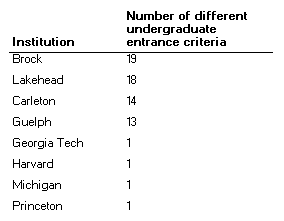Why do Canadian universities make admissions so complicated?
A couple of years ago, for a client, I took a look at the number of different undergraduate admissions requirements there were to various universities. What I found was that at comprehensive universities in Ontario, there tended to be no fewer that 15 separate sets of admission requirements to various programs or faculties, and at some universities it was as high as 20.
Nearly all of them required grade 12 English (though engineering schools tended to waive that requirement), but after that the pre-reqs became bewilderingly complex. Some required both of Ontario’s grade 12 level math courses, some required one or the other, some required one of the two specifically. Some just required a math or science course – some required specific science sources, others required a science course (from a menu of choices).
Then, just for the sake of comparison, I checked some American universities. My data’s a few years old, but I doubt much has changed.
I could go on, but you get the picture. I’m not singling out those four Ontario institutions for special opprobrium, either – I could have picked any four and it would look largely the same. Basically, we let departments and faculty set whatever sets of criteria they want – presumably on the grounds that it will make the entering students slightly easier to teach – while in the US they set single, institution-wide standards and spend the first year or two getting students up to speed via a broader curriculum.
How ludicrous does it get? Well, at one of those Canadian institutions mentioned above, “Computer Science” and “Computer Solid State Technology” have different entrance criteria; so, too, does “Business Admin and Business Economics”. Different disciplines? Sure. But to an 18 year-old the distinctions are meaningless – it’s just bureaucracy for the sake of bureaucracy.
I’d really like to hear a good defence of this practice. Why, exactly, do we require students to gain admission to a program or faculty rather than to the institution as a whole the way Americans do? What do we gain by it? Is there any evidence that we get better students as a result, and better student outcomes as a result? Or are we just indulging the amour propre of department academic committees, and creating confusion for students and extra work for admissions offices in the process?


 Tweet this post
Tweet this post

Hi Alex,
I always thought that the stated admission requirement had value because it provides a signal to the student of what lies ahead in the program.
E.g. you need U level functions for the Economics program, but not for Labour Studies. So if you are math adverse (or just do not have a taste for math) you know that Labour Studies may be a good program for you but Economics is likely not.
Conveying the information before they arrive is a lot better than sorting them in their first year courses.
But there is no doubt that the requirements could be rationalized. Every program gets to set their own requirements and any form of standardization is usually resisted strongly. Some programs also try to set much higher requirements than are reasonably required, thinking that that will ensure that they will only get “good” students in their programs.
Felice